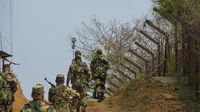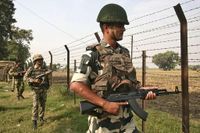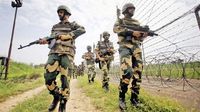A Pakistani Ranger has been apprehended by the Border Security Force (BSF) along the India-Pakistan border in Rajasthan, a development that has heightened tensions between the two nations. This incident occurred on Saturday, May 3, 2025, just days after a BSF constable was captured by Pakistani forces following an inadvertent crossing of the border.
The detained Pakistani Ranger's identity remains undisclosed, and he is currently in the custody of the BSF's Rajasthan Frontier. This follows the detention of BSF constable Purnam Kumar Sahu, who was captured on April 23, 2025, after mistakenly crossing the international border while escorting farmers in the Ferozepur sector of Punjab.
Constable Sahu, 40, has been part of the BSF for 17 years and served in the 182nd battalion. His unit, known as the 'Kisan Guard,' is tasked with protecting Indian farmers cultivating land near the border. Reports indicate that Sahu misjudged the border alignment and stepped into Pakistani territory to rest under a tree, where he was apprehended by the Pakistani Rangers.
Despite India's formal protests and repeated requests for his release, Pakistan has refused to return Sahu. The situation has become increasingly tense, particularly in the wake of a deadly terrorist attack in Pahalgam, Jammu and Kashmir, on April 22, which resulted in the deaths of 26 people, mostly tourists. This attack has further strained relations between the two countries.
In the hours following the apprehension of the Pakistani Ranger, Pakistani Army posts opened unprovoked small arms fire across multiple sectors along the Line of Control (LoC) for the tenth consecutive day. Areas affected included Kupwara, Baramulla, Poonch, Rajauri, Mendhar, Naushera, Sunderbani, and Akhnoor. The Indian Army responded promptly and proportionally to these violations.
This marked one of the most widespread ceasefire violations in recent memory, with numerous Pakistani posts participating simultaneously. Although no casualties were reported from these exchanges, the ongoing hostilities underscore the fragile state of peace along the border.
India's response to the Pahalgam attack has been robust, including the suspension of the Indus Waters Treaty, closure of the Integrated Check Post at Attari, and a significant reduction in the staffing of High Commissions. The Indian government also cancelled all types of visas granted to Pakistani nationals, ordering them to leave by April 30, 2025. Moreover, India's airspace was closed to flights operated by Pakistan Airlines.
In retaliation, Pakistan announced the suspension of all trade with India, including routes to and from third countries through Pakistan, and barred Indian airlines from using its airspace. This tit-for-tat response has only escalated the tension between the two nations.
Amidst these developments, the Pakistani military conducted a test launch of its Abdali surface-to-surface ballistic missile, which has a range of 450 kilometers. Indian officials have described this test as a blatant provocation, particularly given the current circumstances.
As the situation continues to evolve, both nations are grappling with the consequences of the recent events. The BSF has issued advisories urging heightened vigilance among its personnel, especially with the increasing likelihood of inadvertent crossings occurring during patrol duties.
In light of these tensions, the Indian government has also emphasized the seriousness of the situation, with Prime Minister Narendra Modi reportedly granting the Indian Armed Forces full operational freedom to respond to the Pahalgam attack. This directive reflects the urgency with which India is approaching its security concerns along the border.
The family of Constable Sahu has been actively seeking information regarding his status. His pregnant wife, Rajani, traveled from Rishra in West Bengal to meet with senior officials in Ferozepur, hoping to gain insight into the efforts being made for his release.
Despite multiple flag meetings conducted between Indian and Pakistani officials, there has been no commitment from the Pakistani side regarding Sahu's return. Senior officials have expressed frustration at the lack of communication and cooperation from Pakistan, which has historically been a part of standard operating procedures for resolving such incidents.
The ongoing situation highlights the delicate balance of diplomacy and military readiness that both countries must navigate. With rising tensions and the threat of further escalations, the international community is watching closely as developments unfold.
In summary, the apprehension of the Pakistani Ranger amidst the backdrop of the Pahalgam terrorist attack and the continued detention of BSF Constable Sahu are indicative of the fragile state of India-Pakistan relations. As both nations grapple with the fallout, the potential for further conflict remains a pressing concern.






